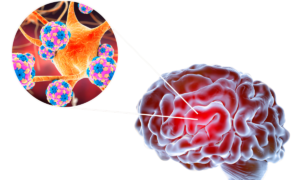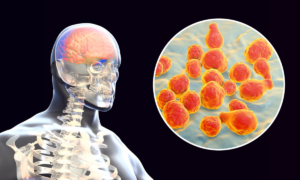
Definition of Brain Tumor
A brain tumor is an abnormal growth of cells within the brain or surrounding tissues and structures near the brain, such as nerves, the pituitary gland, or the pineal gland. Brain tumors can be benign (non-cancerous) or malignant (cancerous). Even benign tumors can cause significant problems if they grow large enough to press on sensitive areas of the brain, disrupting normal brain function. Malignant tumors, also known as brain cancer, are typically more aggressive, grow rapidly, and can invade surrounding brain tissue.
Types of Brain Tumors
Brain tumors are broadly classified based on their origin (primary or secondary) and the type of cells they originate from.
· Primary Brain Tumors: These tumors originate within the brain itself or its immediate surrounding structures. They are named according to the type of brain cell they develop from.
· Gliomas: The most common type of primary brain tumor, arising from glial cells (which support and nourish neurons). Types of gliomas include:
1. Astrocytomas (including Glioblastoma Multiforme – GBM): Arise from astrocytes. GBM is the most aggressive and common type of malignant glioma.
2. Oligodendrogliomas: Arise from oligodendrocytes, which produce myelin.
3. Ependymomas: Arise from ependymal cells lining the ventricles (fluid-filled spaces in the brain).
· Meningiomas: These are typically benign tumors that arise from the meninges, the membranes surrounding the brain and spinal cord. They are often slow-growing.
· Pituitary Adenomas: Usually benign tumors that develop in the pituitary gland, affecting hormone production.
· Schwannomas (Vestibular Schwannoma/Acoustic Neuroma): Benign tumors that arise from the Schwann cells that cover nerves, most commonly the vestibular nerve (involved in hearing and balance).
· Craniopharyngiomas: Rare, usually benign tumors near the pituitary gland.
· Pineal Region Tumors: Tumors that form in or around the pineal gland.
· Medulloblastomas: A common malignant brain tumor in children, arising in the cerebellum.
· Germ Cell Tumors: Tumors that develop from germ cells, often in the pineal or pituitary regions.
· Secondary (Metastatic) Brain Tumors: These are cancerous tumors that originate in another part of the body (e.g., lung, breast, colon, kidney, melanoma) and spread to the brain. They are far more common than primary brain tumors.
Symptoms of Brain Tumors
The symptoms of a brain tumor depend on its size, location, and rate of growth. Symptoms arise from the tumor pressing on brain tissue, blocking the flow of cerebrospinal fluid, or causing swelling. Common symptoms include:
· Headaches: Often persistent, severe, and different from typical headaches, sometimes worse in the morning or with coughing/straining.
· Seizures: Can be generalized (affecting the whole body) or focal (affecting specific parts).
· Nausea and Vomiting: Especially if accompanied by headaches, due to increased intracranial pressure.
· Changes in Vision: Blurred vision, double vision, loss of peripheral vision, or sudden blindness.
· Weakness or Numbness: On one side of the body, or in a specific limb.
· Balance and Coordination Problems: Dizziness, unsteadiness, or difficulty walking.
· Cognitive Changes: Memory problems, difficulty concentrating, confusion, or changes in judgment.
· Personality or Behavioral Changes: Irritability, apathy, depression, or sudden mood swings.
· Speech Difficulties: Slurred speech (dysarthria) or difficulty finding words (aphasia).
· Hearing Problems: Especially with acoustic neuromas.
· Hormonal Disturbances: With pituitary tumors, leading to issues like weight changes, menstrual irregularities, or vision problems.
Causes of Brain Tumors
The exact cause of most primary brain tumors is unknown. However, researchers have identified several risk factors:
· Genetics: Certain inherited genetic syndromes (e.g., Neurofibromatosis Type 1 and 2, Tuberous Sclerosis, Li-Fraumeni syndrome, Von Hippel-Lindau disease) can increase the risk of brain tumors.
· Age: The risk of many types of brain tumors increases with age, though some tumors are more common in children.
· Exposure to Radiation: Previous exposure to high-dose radiation to the head, often from radiation therapy for other cancers, can increase the risk.
· Weakened Immune System: Individuals with compromised immune systems (e.g., HIV/AIDS patients, organ transplant recipients) may have a slightly increased risk of certain rare brain lymphomas.
· Environmental Factors: While extensively studied, no definitive link has been established between brain tumors and environmental factors like cell phone use, power lines, or specific chemicals.
· Race/Ethnicity: Some brain tumor types are more common in certain racial or ethnic groups.
Who Can Suffer from Brain Tumors?
Brain tumors can affect people of all ages, from infants to the elderly. However, the prevalence of specific tumor types varies significantly with age:
· Children: Certain tumors like medulloblastomas, astrocytomas, and ependymomas are more common in children.
· Adults: Glioblastoma multiforme, meningiomas, and pituitary adenomas are more common in adults. The risk for many primary brain tumors generally increases with age.
· Individuals with Genetic Syndromes: As mentioned, those with specific inherited genetic conditions have a higher predisposition.
· Individuals with Cancer History: Anyone who has had cancer elsewhere in their body is at risk of developing secondary (metastatic) brain tumors.
· Immunocompromised Individuals: May be at higher risk for certain types, like primary central nervous system lymphoma.
A brain tumor is an abnormal growth of cells in the brain or surrounding tissues, which can be benign or malignant and may disrupt vital neurological functions depending on its size and location. Symptoms such as persistent headaches, seizures, cognitive changes, or balance issues often prompt further diagnostic testing like MRI or CT scans to determine the type and severity. While the exact causes remain unclear, risk factors include genetic syndromes, radiation exposure, and age, with certain tumors more common in children and others in adults. Just as specialized care is essential for accurate diagnosis and treatment planning, trusted medical professionals play a crucial role in managing complex conditions Dr. Curran evaluates and treats a wide range of clinical problems with expertise and compassion, ensuring patients receive personalized, evidence-based care. Early detection and multidisciplinary management are key to improving outcomes for individuals facing neurological challenges.
For more information Visit us :
Website: http://www.healthsrainbow.com/
Website Blog: https://www.healthsrainbow.com/blog/
Subscriber: https://www.youtube.com/@healthsrainbow4897
Facebook Page: https://www.facebook.com/profile.php?id=100087738795787
Facebook Main Page: https://www.facebook.com/profile.php?id=100072657459686
Instagram: https://www.instagram.com/healthsrainbow/
Twitter: https://twitter.com/healths_rainbow
RELATED VIDEO :
- brain stroke : https://youtu.be/MysY3cHxl0A
- brain tumor : https://youtu.be/aGWA4LwURmk
- Encephalitis : https://youtu.be/PNg_dF6lbP4
RELATED ARTICLE :
- brain stroke : https://www.healthsrainbow.com/blog/2021/09/28/485/
- brain tumor : https://www.healthsrainbow.com/blog/2021/08/28/50/
VISIT OUR WEBSITE :
This video Covers the information about:
What is brain tumor, Types of Brain Tumors, Symptoms of Brain Tumors, Causes of Brain Tumors, Who Can Suffer from Brain Tumors?





